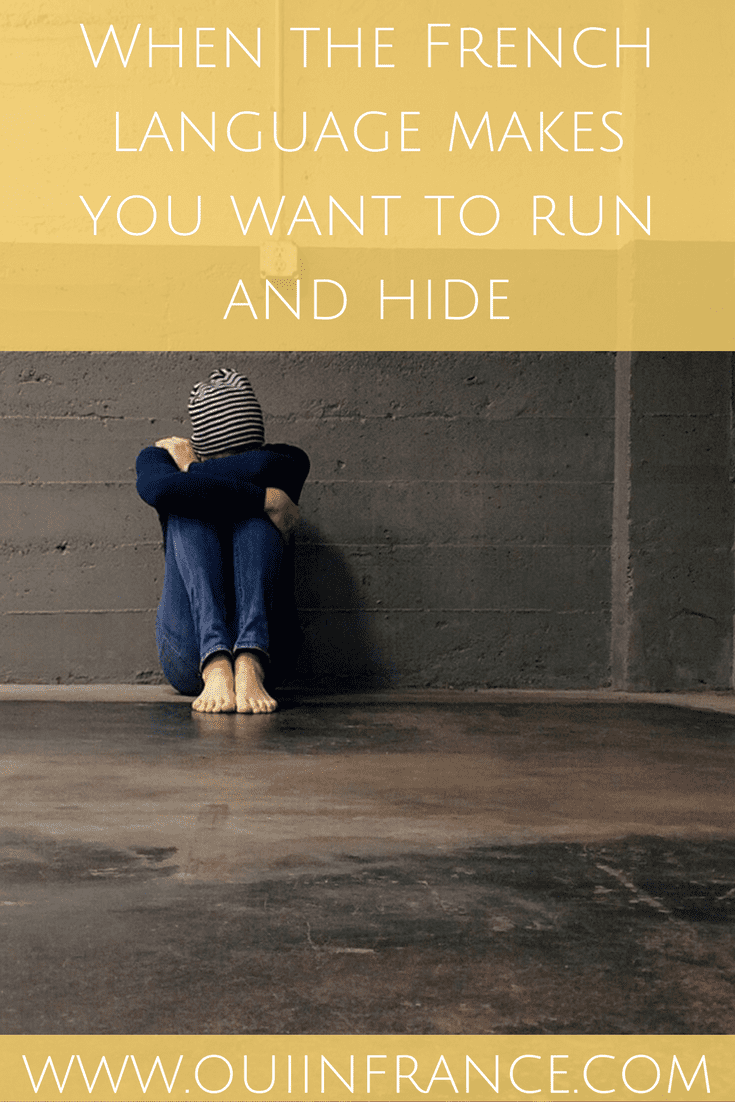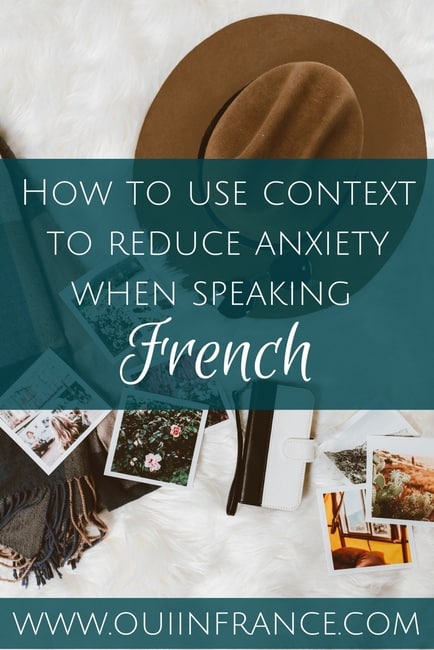One of my favorite topics on this blog is the French language, and why is French so hard, you ask? I’m going to get right into it, but truth be told, I love sharing my trials and tribulations as a foreigner. The mistakes, the frustration, the accent and more. Even if you consider yourself fluent in French or pretty close to it, certain situations will still send shivers down your spine (or maybe it’s just me). Situations like what, you ask?
Is French hard to learn? Read on!
Why is French so hard? You’ll want to run and hide
When speaking in any language other than your native language — especially when you’re at a lower level — you’ll naturally have situations that leave you confused, stressed out, ready to binge on Netflix and questioning what you’re doing with your life. It’s only normal. Sometimes this happens more often than not… especially in the following scenarios. And fear not, none of these are overly France specific. You can delight in language learning fun below no matter what language you’re trying to speak. 😉
Is French yard to learn? Here’s when you’ll want to run and hide:
Talking to kids
Conversing with pint-sized members of our society can be stressful in your native language when the child is still learning how to speak properly, but in your non-native tongue? It’s 10 times worse.
What if you don’t understand?
They may not be able to pronounce the sounds of the French language correctly yet or use proper grammar, so if you’re a little shaky in French to begin with, speaking with kids might make you want to steer clear. They may not understand why you have an accent and make mistakes often. Maybe you’re the first foreigner they’ve encountered!
Luckily for me, our niece and nephew are now old enough to be understood, and my only other interaction with kids is always in the park with Dagny. The come toward us with their hands outstretched and even if what they say sounds nothing like “Est-ce que je peux caresser votre chien s’il vous plait?“, I know it means “May I please pet your dog?” Context is everything. In general though, I’ve lucked out with kids not caring if I sound different.
How long does it take to learn French? >>
Talking on the phone
There’s something about not seeing a person face to face that makes communication a little more difficult if you’re not used to it and this is a major example of why learning French is hard. Without body language and facial expressions, words are just words and that’s why telephone conversations can sometimes be nerve wracking. When I first arrived in France, I’d do everything possible to avoid talking to someone on the phone. But now it’s gotten a lot easier, and usually the pharmacy or pizza place knows me by my accent and they know exactly why I’m calling.
Trying to write down someone’s phone number on the first try
French phone numbers really do make you want to run and hide. They’re composed of 10 digits in pairs of two. So 06.88.45… etc. You say each pair, so zero six, quatre-vingt-huit, quarante-cinq, etc. If you’re not familiar with French, a number like 82 is said literally four, twenty, two. 80 is quatre-vingt (20 times 4=80, then deux, or two).
So if you are trying to decipher it in your head, you may hear quatre-vingt and think 4 or 20 and then realize it’s 80 and by the time you figure that out, the person has already said 2 more digits that you’ve completely missed. Even now, I always listen to voicemails a few times when the person leaves their phone number. They whiz through it so fast that I rarely get it on the first try! Why is French so hard?
Will I be fluent in French after living in France for a year? >>
When speaking to someone with an accent much heavier than yours
Accents aren’t always easy to understand. It depends on the person and their level in the language and also how good you are with accents. What happens when I encounter someone with a super heavy accent? I know I’m going to be apologizing a lot and saying, “Really it’s me, not you!”
My landlady when I first moved to France had a very, VERY heavy Italian accent that even Tom had trouble with. There’s a Portuguese lady in the park that I have the same difficulty understanding. Sometimes two foreigners speaking a common language is easy-peasy and other times it’s quite difficult.
When you realize mid-sentence you have to use a verb you have no idea how to conjugate in the tense you need
You’re feeling good. You’re proud of yourself. You’re speaking about a semi-complicated topic and then bam, it hits you. You’ve gotten midway through your sentence and just realized you have no idea how to conjugate the verb you need in a specific tense. Do you a) guess and hope the person understands or b) ask the person to help you out with the conjugation or c) scramble in your head to rework the sentence using words you do know? It’s up to you, but good on you for being ballsy enough to try. That’s how we learn!
***
Tell me, is French hard to learn? What’s your experience been? WHy is French so hard? What are some other instances where speaking a foreign language makes you want to run and hide?
PIN my why is French so hard post:







OMG…learning Polish was awful for me! There are three Zs in the language and I swear they sound the same. It’s a very difficult language. I only know some basic French, but It’s enough to get me fed and drink wine. 😉
Oh boy, I couldn’t even imagine trying to learn a language like Polish. Were people generally positive toward your efforts when you lived there? And yes, w/French, as long as you can eat and drink!
Very good advice early on was to memorize perfectly my own phone number and address so I could rattle it off without mentally translating.
My embarrassments have usually involved double entendres that I wasn’t familiar with. Like “tremper le biscuit.” Why are they all laughing? Clueless.
(Hint: it doesn’t just mean moisten the cookie, as when one makes tiramisu. It also means have sex!)
Yes, always best to learn your phone # and address. I think that goes on my list of top #10 tips for newbies in any country. Should be like second nature.
That tremper le biscuit story was too funny!
I agree! By the way, I can’t say my US phone number in French, or my French phone number in English 😉
I know what you mean! I have to visualize the # in my head and actually see the numerals in my mind’s eye and then I can say it.
I wish I could speak a different language
It’s never too late!
Yes I am slow with numbers. At the supermarket checkout there is always a slight hesitation before I hand over the money while I translate. I made my first phone call in French last week although I did cheat a little and wrote myself some notes beforehand in case I got brain freeze. I managed to make an appointment and felt quite proud of myself.
Congrats on the phone call! That’s definitely something to be proud of!
Wonderful post! I’ve barely been able to make reservations in French without breaking into a sweat! Numbers? I sometimes want to cry huge crocodile tears. If stuck on how to conjugate I usually panic and just jump right in…usually making a mistake but so far nobody has laughed–so that’s a good thing. Right? 🙁
Excellent work with the reservations. It gets easier after you do it a few times and get to know the questions they’ll ask. Good for you for jumping in and going for it! I know what you mean about the tears. Sometimes other things have been on my mind and then the last straw is some stupid misstep in French and I have to hold it together. But really, great job!
Great post! I had such a hard time teaching English to French kids for that reason… when they didn’t understand my English, and they barely understood my French.
And I can almost feel my brain slowing down when trying to understand those numbers… its like rusty gears in there.
Thank you! That’s exactly how it feels, like your brain is slowing down. Totally get the analogy. When do you leave for Scotland? Hope your final days in Paris are awesome.
Yes, I’m still a little slow with big French numbers! Having to wait for the second digit to write down the first digit so you know if it’s a six or a seven or an eight or a nine really gums up the works 🙂
Most of the kids I know are still too young to grasp why I speak a little differently than their parents, why I write down words in a little notebook, so I’m just waiting for the day when it’s “Maman, pourquoi tatie ne parle pas comme toi ?” and they start correcting my le/la mistakes! Le sigh.
Also, I really like that photo of the cat.
With kids, I feel like around age 8 is when they get all sure of themselves in French and like to correct others. Before then, they don’t realize you’re different. Also, in families where kids are exposed to lots of accents — maybe in bigger cities where people they interact with are from all over the world — the kids don’t really bat an eye since they’re used to hearing people with accents. I just look at it as an opportunity to educate kids about people’s differences and show them where I’m from. Thanks about the cat pic, but it’s not mine. Stock photo that worked quite nicely for the feature image!
FRENCH LANGUAGE: I’m joining in on this conversation a bit late (4+ years) but the issue is still relevant! After 30+ years of living in France, I still, and too often, have those moments where I feel like the ground falls out from under me – not knowing the proper conjugation of a verb. It’s very humbling – I’ve gotten over the frustration, as it comes down to my own fault/lack of studying. Boring as it may seem/be, studying verb conjugation is tantamount to decent communication skills. Not the only element, but central to getting your point across.
From personal experience, starting specifically with verb endings/groups (I, II, III) is the foundation of understanding conjugation. I ignored that from the get-go, and still let it slide for years, with the occasional look-up in my Bescherelle. My bad as I never formally studied French, learning it sink-or-swim style from my entourage (husband, his family, our son, most everyone/everything I come in contact with on a daily basis). I studied dilettante-fashion, only occasionally. But fluid communication in the local language is one of the major keys to integration, no matter where one lives.
So, my word of advice for being at ease in speaking French is to study your verb endings/groups: Group I: -verbs ending in -ER; Group II: verbs ending in -IR (with exceptions regarding present participle ending); Group III: all the others, “irregulars”. A copy of the Bescherelle conjugaison is my handiest of reference books.
I’m exhausted just from thinking through this message! Good luck to you all in learning your language, but we all know that luck has nothing to do with it…
Amicalement,
Deborah .
Biot, France